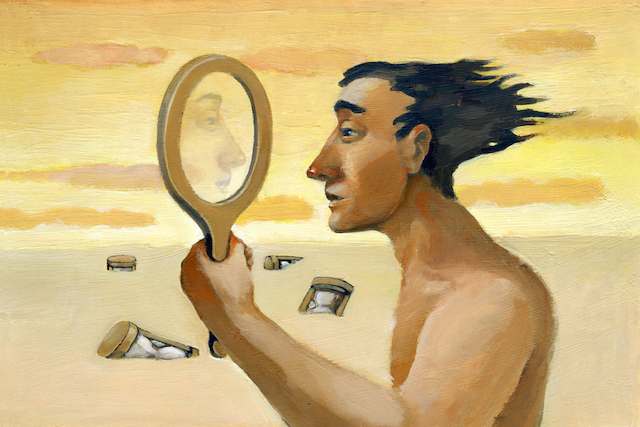
25 Nov2020

share



So what sort of relationship do you have with yourself?
Our self-esteem is what we think about ourselves.
When it’s positive, we have confidence and self-respect. We’re content with ourselves and our abilities, in who we are and our competence. Self-esteem is relatively stable, though it can fluctuate. Healthy self-esteem makes us resilient and hopeful about life.
Self-esteem affects not only what we think but also how we feel and behave. It has significant ramifications for our happiness and enjoyment of life. It considerably affects events in our life, including our relationships, our work and goals, and how we care for ourselves and our children.
Impaired self-esteem can affect anyone. Even the most outwardly confident and successful person can experience a crippling poor self-esteem.
Although difficult events, such as a break-up, illness or loss of income may in the short term, impact on our self-esteem, those with a healthy self-esteem will soon rebound to think positively about themselves and their future.
Even when we fail, it doesn’t diminish our self-esteem. People with healthy self-esteem credit themselves when things go right – and when they don’t, they consider external causes and also honestly evaluate their mistakes and shortcomings. Then they improve upon them. They don’t blame others for their own mistakes or choices.
I prefer the terms healthy and impaired self-esteem rather than high and low, because narcissists and conceited individuals who appear to have high self-esteem actually don’t. Theirs is inflated, compensates for shame and insecurity, and is often unrelated to reality. Boasting is an example of impaired self-esteem, because it indicates that the person is dependent on others’ opinion of them. Healthy self-esteem requires that we’re able to honestly and realistically assess our strengths and weaknesses. We’re not too concerned about others’ opinions of us. When we accept our flaws without judgement, our self-acceptance goes beyond self-esteem.
Impaired self-esteem negatively impacts our ability to manage adversity and life’s disappointments. All of our relationships are affected, including our relationship with ourselves.
When our self-esteem is impaired, we feel insecure, compare ourselves to others, and doubt and criticise ourselves. We neither recognise our worth nor honour and express our needs and wants.
Instead, we may self-sacrifice, defer to others or try to control them and/or their feelings towards us to feel better about ourselves. For example, we might people-please, manipulate or devalue them, provoke jealousy or restrict their association with others. Consciously or unconsciously, we devalue ourselves, including our positive skills and attributes, making us hypersensitive to criticism.
We may also be afraid to try new things because we might fail. We might tell ourselves things like, “If I try and fail, I’ll look like an idiot and people will make fun of me.” Women, especially those who are mothers, very often exhibit impaired self-esteem through their behaviours and choices.
The following lists symptoms that reflect healthy vs. impaired self-esteem. Self-esteem varies on a continuum. It’s not black and white. You may relate to some but not all:
Our self-esteem begins developing as children. Growing up in a dysfunctional family can lead to a weakened self-esteem as an adult. Commonly in such families, as a child, you don’t have a voice; your opinions and desires aren’t taken seriously.
Parents in these families usually have impaired self-esteem and are unhappy with each other. They themselves neither have nor model good relationship skills, including co-operation, healthy boundaries, respect for others, assertiveness and conflict resolution. They may be abusive, controlling, interfering, manipulative, indifferent, inconsistent or just preoccupied. Directly or indirectly, they may shame their children’s feelings, personal traits and needs.
Children in these families learn that it’s not safe to be, to trust or to express themselves. They feel insecure, anxious and/or angry. They feel emotionally abandoned and conclude that they are at fault, they are not good enough to be acceptable to either or both their parents. However, they might still believe that they are loved. Eventually, these children don’t like themselves and feel inferior or inadequate. They grow up with impaired self-esteem and learn to hide their feelings, walk on eggshells, withdraw and try to please, or become aggressive. This reflects how toxic shame becomes internalised.
Shame runs deeper than self-esteem. It’s a profoundly painful emotion rather than a mental evaluation. Underlying toxic shame can lead to impaired self-esteem and other negative thoughts and feelings. It’s not just that we lack confidence, rather we might believe that we’re bad, worthless, inferior or unlovable. It creates feelings of false guilt, fear and hopelessness, and at times, feeling irredeemable. Shame is a major cause of depression and can lead to self-destructive behaviour, eating disorders, addiction and aggression.
Shame causes shame anxiety about anticipating shame in the future, usually in the form of rejection or judgement by other people. Shame anxiety makes it difficult to try new things, have intimate relationships, be spontaneous or take risks.
Sometimes we don’t realise that it’s not others’ judgements or rejection that we fear, but our failure to meet our own unrealistic standards, such as being able to do something perfectly the very first time we do it. We judge ourselves harshly for mistakes that others would also make. This pattern is very self-destructive for perfectionistic people. Our self-judgement can paralyse us so that we’re indecisive, because our internal critic will judge us no matter what we decide.
Our relationship with ourselves provides a template for our relationships with others. It impacts our relationship happiness.
This is because self-esteem determines our communication style, boundaries and our ability to be intimate. Research indicates that a partner with healthy self-esteem can positively influence his or her partner’s self-esteem, but it also shows that impaired self-esteem portends a negative outcome for the relationship. This can become a self-reinforcing cycle of abandonment lowering self-esteem.
Impaired self-esteem hinders our ability to speak up about our wants and needs and share vulnerable feelings. This compromises honesty and intimacy. As a result of insecurity, shame and impaired self-esteem as children, we may have developed an attachment style that, to varying degrees, is anxious or avoidant and makes intimacy challenging. We pursue or distance ourselves from our partner and are usually attracted to someone who also has an insecure attachment style.
Generally, we allow others to treat us in the manner that we believe we deserve. When we don’t respect and honour ourselves, we won’t expect to be treated with respect and might accept abuse or withholding behaviour. Similarly, we may give more than we receive in our relationships and overdo at work.
Our inner critic can be judgemental of others, too. When we’re critical of our partner or highly defensive, it makes it difficult to problem-solve. Impaired self-esteem can also make us suspicious, needy or demanding of our partner.
Self-esteem is generally determined by our teenage years; some of us struggle all our lives with impaired self-esteem and even the resulting depression.
However, we can change and build healthy self-esteem. Raising self-esteem means getting to know and love yourself – building a relationship, as you would with a friend – and becoming your own best friend. This takes attentive listening, quiet time, reflection and commitment.
The alternative is to be lost at sea, continually trying to prove yourself or win someone’s love, while never feeling truly lovable or enough – like something is missing. It’s difficult to get outside our own thoughts and beliefs to see ourselves from another perspective. Therapy can help us change how we think, act and what we believe.